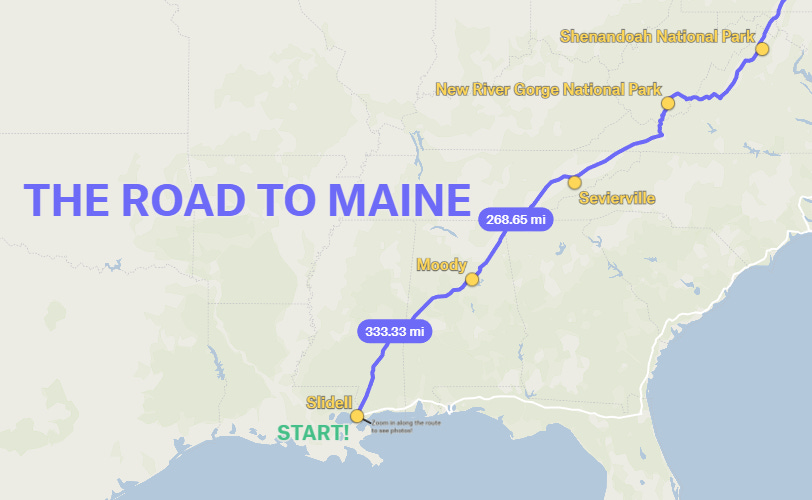Migratory Dispatch No. 7: The Power of Letting Go
The Duality of Adventure During Six Weeks of Van Life
By the time this email hits your inbox, Grasshopper — the name bestowed upon our camper van — once again is parked in front of our home in Slidell, Louisiana, after six weeks on the road.
It was six of the most rewarding and most confusing weeks of my life.
Let’s start with the confusion.
While living on the road for six weeks might sound appealing, the reality is that this was, in a lot of ways, work. As they say, life is mostly maintenance and that is no less true while living in a van. There are still dishes to wash, laundry to fold, food to prepare and cook, and dogs to walk.
The chores might be the same as home, but the effort feels different because of different considerations. For instance, you need to consider water and power usage more while living with finite resources on the road. That is not necessarily a bad thing, it just occupies more of your brainpower than when you are at home where resources feel limitless.
Then there are the discomforts. To name a few:
The limited amount of space for four living beings to share.
Getting “the knock” by the police at two in the morning and being told to move the van.
An infestation of hundreds if not thousands of biting no-see-ums in the van while camping on a remote island.
The air conditioning system failing as soon as you re-enter the hot and humid South with a few days of driving still to go.
It would be one thing to live with these discomforts if you were retired and traveling full-time. Or if you were staying put in one location for an extended period of time. These would be the normal discomforts of everyday life! But juggling work and career while also trying to help with the responsibilities, planning, and all the newness of everything at “home” is trying.
“Difficulties strengthen the mind as labor does the body.”
— Seneca
My wife Sarah asked how I would describe the experience overall: As traveling, an adventure, or an expedition? I chose other: It was an endurance event.
While it certainly was no vacation — I cringe at it being called that — not all is lost! Here come the rewarding parts of the experience, and they are significant. In fact, in my estimation, the rewarding parts tip the scales in favor of embarking on these “endurance events.”
You get to work in some of the most beautiful places with new hikes and swimming spots in your backyard every day. You get to meet amazing, friendly locals and fellow travelers. You sample new-to-you local food and drink every single day. You encounter birds and other wildlife that you’ve only seen on television or in books. You get to experience a familiar season in an unfamiliar way.
Perhaps the biggest reward of all is this: You are forced to confront yourself.
There is no hiding from you on the road. “Wherever you go, there you are” rings true out here. The road and its trials thrusts introspection upon you, and you often do not like what you find.
This is a road toward change for the better.
To wit, when you start a trip like this, if you are anything like me, you try to control the who, what, where, when, and how of everything: Who gets to drive, what things to do, where to get gas, when to take the dogs out, how to best organize the small space, etc.
One of the biggest takeaways these last six weeks is how much power there is in loosening your grip on things, in letting go of some of that control.
Letting go allows you to let life unfold as it will — which is what was going to happen anyway, regardless of how much control you think you have. Instead of constantly fighting against what actually happens because of your expectations for what should happen, you live more fluidly and are better able to flow with the reality of your situation.
This lends itself well to practicing your flexibility and adaptability, your ability to figure it out on the fly, and also your gratitude. Loosening your grip on everything creates space for others to step up and flourish. Once I realized that I did not have to attend to every little fire during the trip, I got to experience how competent and capable — and wonderful — Sarah is.
We returned home to our usual creature comforts, habits, and routines, but nothing is the same as it was before. We returned as unfamiliar beings to this once-familiar home.
The charge now: To incorporate all the lessons from a life on the road into our life at home. Just like how living on the road is both rewarding and confusing, doing this will be as simple and as hard as that.
Follow Along with Felt
Maps stand the test of time when it comes to documenting a journey. It is a natural medium through which to share the experience, as there is such a strong current of geography and place on any trip through the physical world.
To that end, Felt, a collaborative, web-based mapping platform, is being used to catalog our trip this summer. Felt democratizes map-making with an easy-to-start and easy-to-use model that seems well-suited for this type of application.
Follow along on the map here.
The Boondocking Count
One of the goals for the trip this summer is to boondock at least 50 percent of the time. We are going to be away from home for 42 days, so that means we need to boondock at least 21 nights to succeed.
The updated boondocking count through this morning:
Total nights = 42
Total nights boondocking = 30
—
71 percent boondocking







